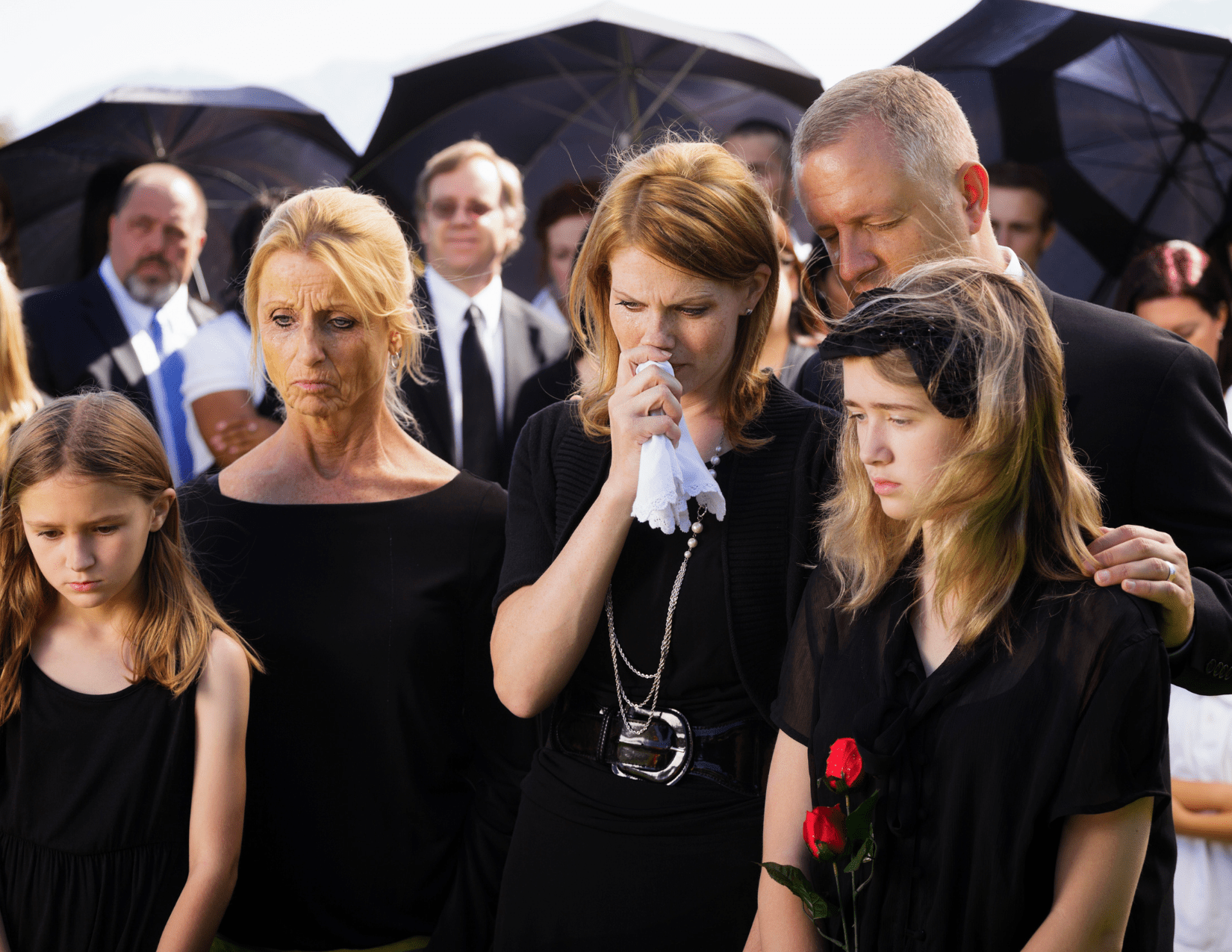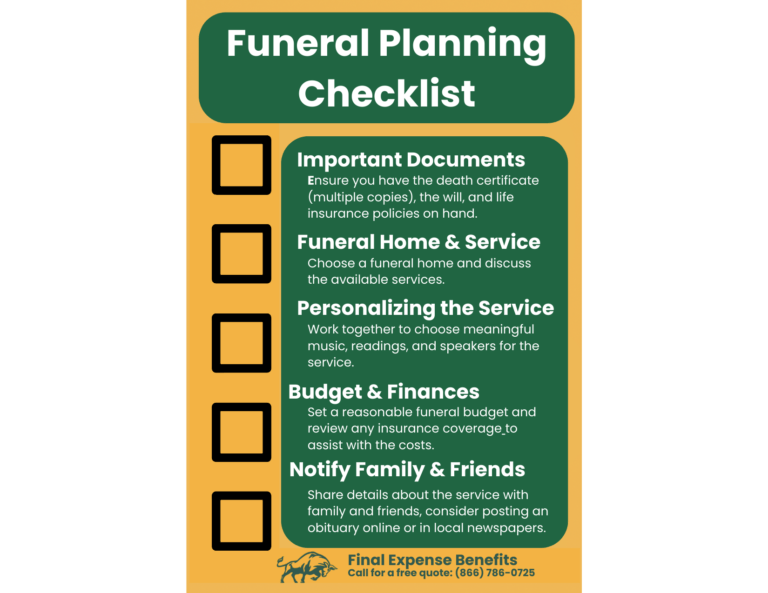
Funeral Planning for Families | Steps Towards a Meaningful Service
Updated on Apr 10, 2025 • 2 min read
Funeral planning is a significant, emotional task that requires careful thought and family involvement. It’s a time to come together, honor the life of a loved one, and make decisions that reflect their wishes while providing closure for everyone. While this process can feel overwhelming, planning with family ensures that all perspectives are considered, reducing confusion and potential conflicts. It also offers emotional support during a challenging time.
From handling financial decisions to selecting the best type of service, this step-by-step guide to funeral planning with family will make the process more manageable and ensure that your loved one’s wishes are honored.
Our talented agents are available every weekday from 9 a.m. to 5 p.m. Call us at (866) 786-0725 to learn more. Be sure to check our free funeral expense calculator for a clear breakdown of funeral expenses based on your choices.
Why Involve the Family in Funeral Planning?
Involving family members creates an opportunity for shared responsibility, clear communication, and meaningful collaboration, which can help alleviate some of the stress. It also provides essential emotional support, helping everyone process their grief together. When family members are part of the decision-making process, the deceased’s wishes are fully understood and respected, preventing potential miscommunication. Moreover, involving family members in planning strengthens the family bond and creates collaboration,
Moreover, involving family members in planning strengthens the family bond and creates collaboration, allowing everyone to contribute their memories and perspectives. This collaborative process also creates a personalized service that feels meaningful and true to the deceased’s life. Understanding the legal aspects of funeral planning with next of kin and legal roles is another important factor, as knowing who has the legal right to make decisions can help avoid conflicts later on.
Steps to Take Before Planning the Funeral
It’s important to confirm any pre-arranged funeral plans, wishes, and preferences the deceased had in place to simplify the process. Clear communication about roles and responsibilities within the family will prevent confusion or misunderstandings during the planning process. Choosing a funeral home or director is one of the most important decisions to make together as a family, as they will assist in organizing the service.
Types of Funeral Services
Funeral services come in various forms, from traditional funerals to memorial services and celebrations of life. Each type of service has its significance. For example, a traditional funeral or cremation service may include a religious ceremony, while a celebration of life may be more informal, focusing on positive memories and stories. Family members should also contribute ideas for music, readings, and speakers, as these elements help personalize the service and make it meaningful. Additionally, incorporating photographs, videos, or other memorabilia into the service is a great way to honor the deceased’s legacy, making the service more personal and heartfelt.
Direct Burial
Direct burial is a simple burial where the person’s body is placed in a casket and buried soon after death, without a funeral or viewing beforehand. There’s no embalming or big service right away, and the family can choose to have a memorial service later if they want. Direct burial is significantly less expensive than a traditional burial and is a good option for people who want a quiet, respectful goodbye without extra add-ons.
Traditional Burial
A traditional burial is the most common way people are laid to rest after they die. The person’s body is usually placed in a casket and buried in the ground at a cemetery. Before the burial, there may be a funeral where family and friends gather to remember and honor the person’s life. Sometimes, the body is prepared with special care and dressed in nice clothes. A headstone or grave marker is placed at the burial plot so people can visit and remember them. Traditional burials give families a special place to go and feel close to their loved one.
Cremation
Cremation is a way of saying goodbye to someone who has died by using heat to turn their body into ashes. This happens at a special place called a crematory. Afterward, the ashes are placed in a container called an urn. Families can decide to keep the ashes, scatter them in a special place, or bury them. Cremation is a common choice because it can be easier and less expensive than a traditional burial.
Direct Cremation
Direct cremation is a simple and quick way to take care of someone’s body after they die. The body is taken straight to a crematory without having a funeral or viewing first. After the body is turned into ashes, the ashes are given to the family in a container. Families can then choose to have a memorial service later if they want, or they can keep, bury, or scatter the ashes. Direct cremation is often less expensive than other options and allows families to take their time planning a goodbye that feels right for them.
Green Burial
A green burial is a natural way to bury someone who has died, without using harmful chemicals or materials. Instead of a fancy casket or chemicals to keep the body from breaking down, the person is placed in a simple wooden box or wrapped in a cloth so their body can return to the earth naturally. Green burials usually happen in natural burial grounds, where trees, plants, and animals can live without being disturbed. This type of burial is better for the environment and helps keep nature healthy. It’s a gentle and caring way to say goodbye.
Tree Pod Burial
Tree pod burials are an eco-friendly alternative to traditional funerals, allowing a person’s remains to support new life. In this method, cremated remains are placed in a biodegradable urn designed to nurture a tree planted above it. As the urn decomposes, the ashes enrich the soil, aiding the tree’s growth. This approach offers a sustainable way to honor the deceased and contributes positively to the environment. The cost of a tree pod burial varies, with cremation pods ranging from $135 to $370, excluding the price of the sapling. While whole-body pods are still in development, cremation pods are currently available, providing a meaningful and environmentally conscious memorial option.
Burial at Sea
Burial at sea has evolved into an eco-friendly option known as memorial reef burials. In this process, cremated remains are mixed with concrete to form artificial reef structures, placed on the ocean floor to create habitats for marine life. This method fulfills the deceased’s wish to rest in the ocean, and contributes positively to the environment. Families receive GPS coordinates of the reef’s location, allowing them to visit and pay respects. Memorial reef burials have gained popularity as a cost-effective and sustainable option compared to traditional funerals.
Alternatives like final expense insurance may offer greater flexibility and efficiency. Final expense insurance can help cover funeral costs while leaving funds available for other needs, providing more financial security for your loved ones. We always recommend considering all options, including final expense insurance, to ensure the most suitable and comprehensive coverage for your family.
Call Final Expense Benefits at (866) 786-0725 to learn more about life insurance and to develop your insurance plan, and be sure to check our free funeral expense calculator for a clear, itemized view of funeral costs based on your preferences.
Pre-Planning Your Funeral
Individuals have reported that 75% of those who planned the funeral at ages 30-40 felt a burden lifted from their spirits moving forward. Many families utilize prepaid funeral plans to alleviate the burden of funeral costs ahead of time, making sure that arrangements are in place when the time comes. While prepaid funeral plans can be a good option for some, they may not always be the best choice for every family. While prepaid funeral plans can seem like a convenient way to lock in funeral costs ahead of time, they do come with potential downsides.
For example, if the funeral home you’ve chosen goes out of business, it may be difficult to recover your funds or transfer them to a different provider. It’s important to ask about refund policies and make sure the funeral home is financially stable before committing. Additionally, prepaid plans can end up costing more than other options due to maintenance fees, estimated interest increases, and funeral home service charges.
There’s also the risk of mismanagement. Although most funeral homes are reputable, some have mishandled prepaid funds in the past. That’s why it’s crucial to research the provider thoroughly and read reviews. If you’re looking for more flexible and secure options, final expense insurance might be a better fit. It offers similar financial support without locking you into one provider or location. At Final Expense Benefits, we can help you explore these alternatives to find the best fit for your family’s needs.
Dealing with Conflict in Family Funeral Planning
Conflicts can arise during funeral planning due to emotional stress, financial concerns, or differing opinions on how the service should be conducted. Acknowledging that disagreements are a normal part of the process can help ease tension. The key to managing conflicts is maintaining open communication and ensuring everyone’s opinions are heard and respected. Offering strategies such as compromise or even mediation can help resolve disagreements and keep the focus on honoring the deceased’s wishes.
The ultimate goal is for the family to unite in honoring the departed, ensuring that the service reflects the collective love and respect for their life. Avoid unnecessary disputes and make the planning process smoother for all involved by honoring the deceased. To help streamline this process, it’s beneficial to use a funeral planning checklist, ensuring everyone is on the same page about the tasks ahead.
Conclusion
Planning a funeral with family can be a meaningful experience: one that brings loved ones together, encourages open communication, and ensures your loved one’s wishes are honored. When families work together, the process becomes less stressful and more purposeful. As you plan, it’s also important to consider how final expense insurance can help ease the financial burden. It provides peace of mind by covering funeral costs and giving your family the support they need during a difficult time.
Contact Final Expense Benefits to learn more about life insurance and to develop your insurance plan. Call us at (866) 786-0725 for more information, and be sure to check our Free funeral expense calculator for a clear, itemized view of funeral costs based on your preferences.
FAQ
How do I start a conversation about funeral planning with my family?
A: Begin gently by explaining that you want to make things easier for your loved ones in the future. You can say something like, “I’ve been thinking about how to make things easier when I’m gone, and I’d like to talk about planning ahead.”
When is the right time to start talking about funeral planning?
There’s no “perfect” time, but the earlier, the better. Many people start planning in their 30s or 40s to ensure everything is in place. Starting the conversation during a calm and comfortable moment—rather than during a crisis—can make it easier for everyone involved.
What should we include in our funeral planning discussions?
You’ll want to talk about burial vs. cremation, preferred funeral home, ceremony preferences, final resting place, and how expenses will be covered. Also, discuss whether you’d like to use a prepaid funeral plan or final expense insurance.
What if my family disagrees about certain funeral choices?
Clear communication is key. If you’re making your own plan, be as specific as possible about your wishes. If you’re planning for someone else, try to focus on honoring what they would have wanted rather than personal preferences.
Is it better to choose a prepaid funeral plan or final expense insurance?
It depends on your needs. Prepaid funeral plans lock in today’s prices with a specific funeral home, but they can have risks if the provider goes out of business. Final expense insurance offers more flexibility and can be used for other costs beyond the funeral.





